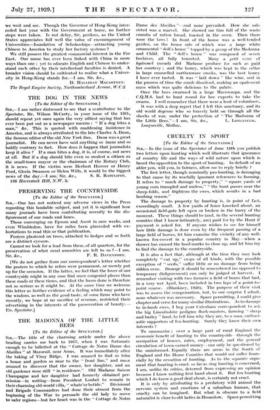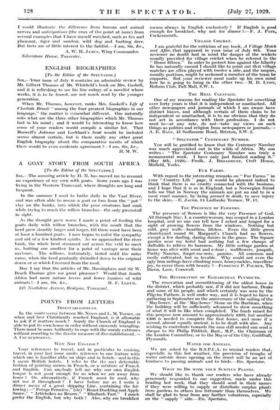CRUELTY IN SPORT
[To the Editor of the SPECTATOR.] SIR,—In the issue of the Spectator of June 15th you publish two letters upon hunting which well illustrate that ignorance of country life and the ways of wild nature upon which is based the opposition to the sport of hunting. In default of an abler pen, will you, in fairness, allow me to reply briefly ?
The first letter, though nominally pro-hunting, is damaging to that cause by its woefully ignorant references to farming. It refers to " much damage to property," " square yards of young corn trampled and useless," " the hunt passes near the sheep-folds, and frightens the ewes, which results in a bad lambing season."
The damage to property by hunting is, in point of fact, exceedingly small. A few yards of fence knocked about, an occasional field-gate left open or broken in the hurry of the moment. These things should be (and, in the several hunting counties that I know intimately, are) paid for by the Hunt if payment is asked for. If anyone wishes to see for himself how little damage is done even by the frequent passing of a large field of horses, let him examine the vicinity of any well- known fox-covert in a popular country in May—when a shower has caused the hoof-marks to close up, and let him try to find the damage to the countryside.
It is also a fact that, although at the time they may look completely " cut up," crops of all kinds, with the possible exception of " seeds," suffer little or no damage from being ridden over. Damage it should be remembered (as opposed to temporary disfigurement) can only be judged at harvest. I remember visiting with two farmers a field of beans that had, in a very wet April, been included in two laps of a point-to- point course. (Blankney, 1920). The purpose of their visit was to assess the compensation, but, to our surprise I admit, none whatever was necessary. Space permitting, I could give chapter and verse for many similar illustrations. As to damage to in-lamb ewes, I beg your Caterham correspondent to ask the big Lincolnshire pedigree flock-masters, farming sheep and barley " land, to tell him why they are, to a man, enthusi- astic supporters of fox-hunting. Surely they know their own interests ?
To summarize ; over a large part of rural England the economic benefit of hunting to the countryside----through the occupation of houses, rates, employment, and the general circulation of town-earned money—min only be questioned by the uninformed. Equally there are areas in the South of England and the Home Counties that would not suffer finan- cially by the cessation of hunting. As to the separate argu- ment that hunting is cruel, so far as stag hunting is concerned, I am, unlike its critics, deterred from expressing an opinion because I know nothing first hand about it. But fox hunting which I do know a good deal about, is certainly not cruel.
It is only by attributing to a predatory wild animal the nervous system and emotions of a suburban human, tiiit cruelty can be imagined. But what is obscure to a field naturalist is clear to old. ladies in Hounslow. Space permitting I could illustrate the difference from human and animal nerves and anticipations (the crux of the point at issue) from several examples that I have myself watched, such. as fox and pheasant, tiger and sambur, wild dog" and barking deer. But facts are of little interest to the faddist.—I am, Sir, &c., A. W. H. JAMES, Wing Commander. Silverstone House, Towcester.



































 Previous page
Previous page